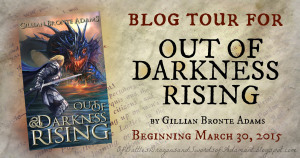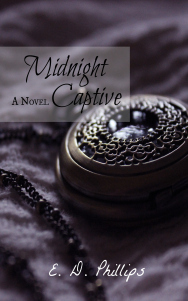Ashlee Willis's Blog, page 6
May 7, 2015
Cinderella, Edits and Assassins
So what do Cinderella, edits and assassins have in common? It’s not a riddle, I promise :) They’re all the things that have been driving me bonkers lately, that’s what! (Don’t worry – the assassin isn’t after me…)
CINDERELLA
I have been working on several things.��First and foremost has been the Cinderella retelling I’ve been chattering on about  for the past several weeks. Yes, I realize I promised a cover reveal quite soon for this story (the cover is finished and absolutely beautiful!!) – and I’m still planning on that. I’ll be putting out a request for anyone wanting to be involved with the reveal through my newsletter,��probably within the next week or so. So be on the lookout!
for the past several weeks. Yes, I realize I promised a cover reveal quite soon for this story (the cover is finished and absolutely beautiful!!) – and I’m still planning on that. I’ll be putting out a request for anyone wanting to be involved with the reveal through my newsletter,��probably within the next week or so. So be on the lookout!
EDITS
At the behest of my agent, I officially hired a professional editor who will be giving my story the finishing polish it needs. This was a first for me, and rather��exciting. Can’t wait (i.e. panicked/scared) to see what she’s got to say. I am confident she’ll help me make this story the best it can be.
After the edit is finished, I estimate that it will be approximately 6-8 weeks until I release the novella. That will put the release date somewhere in July.��We’ll see. Again, as a first-timer I’m very unsure of an exact date at this point, so I’m making no promises! I’ll keep updating you with my progress, of course :)
ASSASSINS
When I get moments between preparing for publication of my Cinderella story, I’ve been working on my novel (the one with  dragons and assassins and mysterious identities, among other things). After hearing from my beta readers, I’ve decided this story needs a couple of scene rewrites. A simple thing – that is, if these scenes were simple scenes…which they’re decidedly not. Try climax scene and ending scene. Yikes. Daunting. Lots of prayer will be happening, let’s put it that way.
dragons and assassins and mysterious identities, among other things). After hearing from my beta readers, I’ve decided this story needs a couple of scene rewrites. A simple thing – that is, if these scenes were simple scenes…which they’re decidedly not. Try climax scene and ending scene. Yikes. Daunting. Lots of prayer will be happening, let’s put it that way.
SUMMERTIME
My son will be out of school in 6 days. Mini-vacations and friend play-dates and lots of tree-climbing and swimming are planned for this summer, too. We’ve already caught a dozen toads and two turtles – talk about starting the summer right! Having my Bug’s��sweet little face to look at every day and spending time playing with him will help make the writing and editing less intense and stressful – at least, that’s my hope! Either way, I’m looking forward to summertime.
What does your summer look like?


May 1, 2015
Book Blurb Blues
I’ve been in the process of writing and polishing the back cover description for my upcoming novella. And I’ll tell you the truth – it’s not fun at all. I keep wanting to shout, “But I’m a book writer, not a blurb writer! I’m good at unraveling my story over the long haul, not condensing all of it into a tight little space!”
I think it comes down to a few specific things that should be included. Here’s my very amateur go at it. Ready?
Setting: Things need to be mentioned in the blurb that give the reader an idea of where this story takes place and what  they are walking into. Whatever these end up being – certain qualities/people/creatures/props – they should be given a nod in order to create��a sense of setting. Many of these depend on the genre. Fantasy more so than most, I think.
they are walking into. Whatever these end up being – certain qualities/people/creatures/props – they should be given a nod in order to create��a sense of setting. Many of these depend on the genre. Fantasy more so than most, I think.
Characters: Ok, no-brainer. The main character has to be introduced, along with any other character who is important to the plot as a whole. Maybe even the antagonist. After all, books are about people��first and foremost, right?
Goals: More than just mentioning the main character, we have to know what she desires. What is the crux of her journey, whether it’s a physical, spiritual or emotional one? I want to know up front that this girl has something driving her forward. Otherwise I’ll suspect that I’m in for a yawn-worthy read.
Complication: Is there a person or circumstance that is thwarting her from her goal? Well, we need to know about that too. A little bit. Don’t give too much away, though. The reader will want to hear��about it, certainly; otherwise, why open the book at all? But I personally have difficulty with this one. How much to tell without giving too much away and ruining important surprises, but making it enough that it creates curiosity in the reader? It’s a very fine line, my friend.
Stakes: What is at risk if the main character doesn’t (or perhaps does!) obtain what she wants? Will she lose her life? Her family? Her self-respect? Her cat? All of the above? Whatever the stakes are, a blurb-reader wants to know them up front. Or at least I always do. It puts that extra fire in me that says, “I just have��to know what happens!!”
Hope: So the poor main character has been given an ultimatum, a timeframe to achieve something, a roadblock that is seemingly impassable. What now? Well again, a simple blurb can’t give too much away. But we at least need to see that glimmer – that small flash of hope that tells us things might be … could be … all right.
Brevity: Ah, brevity, my bane. It’s like trying to fit my post-baby self into the size 4 jeans��I wore a few short years ago. Not likely. I need a serious word diet to get the 25,000 words of my novella into a 200-word blurb. It’s painful, I’m not gonna lie. It takes lots of trimmings and re-writes. Lots.
So …. aaallll these things need to fit into a blurb? Yep. Ok, well, most of them. Some of them can be accomplished with a few very choice words. Some of them, such as setting, can be almost implied between the lines without ever mentioning directly at all.
Yep, I’ve got my work cut out for me.
So what are the things that draw you in when you read a book blurb? What is most likely to get you to pick up a book and say, “I have to take this home and read it right now!”


April 25, 2015
I’m Saying “No”
I say no to letting my precious gift of a life slip by while I drown in an electronic, anti-social, busy world.
I say no to not making decisions, or letting others make them for me, thus making the worst decision of all.
I say no to ignoring the friends who are near and needing me.
I say no to fearing freedom and clinging to slavery like a coward.

freedigitalphotos.net
I say no to complaining and bickering about the dirt I tread on, when God has given me gems enough to light the world.
I say no to listening to Satan’s lies, which keep me from spreading God’s love more fully.
I say no to being offended for my own sake, because in the end that’s only selfishness anyway.
I say no to the laziness and indecision that keep me from coming fully alive and awake, as I was meant to be.
I say no to the mentality that big moments are what we live for, when the small ones are the rich��fabric��my life has been made of thus far.
I say no to seeing only with my eyes, when God has given my heart the ability to see His Kingdom all around me every day.
I say no to waiting for someone to show love and attention to me before I give it in return.
I say no to demanding fairness for myself in relationships and in life.
I say no to walking timidly and with fear, when God has given me the wonderful, beautiful heart of a lion.
And I say yes … yes to God alone, and the joy and the life and the purpose He has for me.
Fear not, for I am with you; be not dismayed, for I am your God. I will strengthen you, yes, I will help you. I will uphold you with my righteous right hand. – Isaiah 41:10 (NKJV)


April 1, 2015
A Love Letter – Out of Darkness Rising
This is a guest post by Gillian Bronte Adams.
____________
Brevity may not be my strength, but if you were to ask me to describe Out of Darkness Rising in only a few words, I would say that at its heart, it is a love letter.
To whom, you ask?
I suppose it could be written to everyone who believed in me when I scarce believed in myself. Publishing this book has taken me along such strange and twisting paths that I was tempted to throw up my hands and admit defeat more than once.
Just as ���Frodo wouldn���t have got far without Sam,��� I wouldn���t have ���got far��� without my stalwart companions encouraging me along each step of the way.
It could be written to writing itself, a wild compilation of all the things I love about fantasy and fairytales.
It could even be written to you.
If you are anything like me, you can easily lose yourself in a storyworld for hours at a time. Far too frequently when I was growing up, my younger siblings would get frustrated when they tried to talk to me because once my nose was buried in a book, I would smile and nod but not hear a word they were saying.
Reading my own books is a bit different. Once the final edit has been finished and the final proof completed, there is no element of surprise left in the story for its writer. I have planned the action down the second, dreamed up the dialogue in my own noggin, tweaked each word to sound ���just so,��� and have the plot fixed as firmly as a road map before my eyes.
Every now and then, there remains a battle scene that sets my blood pumping, a section of prose that makes me sigh in contentment, or a piece of witty banter that brings a chuckle to my lips. I can still shed a tear or two over the death of this character or the sorrow of that one over there.
But I am rarely deeply stirred by the things I write after the initial writing, simply because I wrote them.
Not so with Out of Darkness Rising.
Even now, six years after the imagining and four major rewrites later, something about this novella still manages to grip me by the throat and sink its teeth into my heart.
Perhaps because there is so much of me written into this novella. So much of my hopes and fears, my struggles, my doubts, my dreams.
This book grew from the wild imaginings of a girl who dreamed an impossible dream. It was tempered by a girl who faced the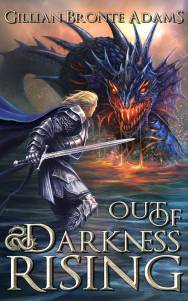 difficulties of impossibility, set her teeth against the challenges, and braved her fears to see success ��� only to watch that success shatter in her hands. It was made anew by a girl who had learned enough to know she had so much more to learn.
difficulties of impossibility, set her teeth against the challenges, and braved her fears to see success ��� only to watch that success shatter in her hands. It was made anew by a girl who had learned enough to know she had so much more to learn.
It was edited in pain and handed to you now with the air of a knight returning from battle with the enemy���s standard in hand.
And yet, this book was not written for you.
It was not even written for me.
It was written as a love letter to my Savior.
In Out of Darkness Rising, you catch a glimpse���only a glimpse, mind you���of my heart. For I am Hadriel, wild to be free. And I am Marya, too ashamed to stand. Like Hadriel, I have marched out boldly on a course of my own choosing ��� only to find myself bound by chains of my own making. Like Marya, I have cried out into the storm and the night that I am abandoned, not knowing and not caring that it is I who have wandered.
Like the villagers, I have stood upon the Stone and felt the heat of the Serpent���s breath, and when my craven knees could not bear me up, I have knelt in shame, only to have my head lifted by the One who bore my pain.
By my Redeemer.
Though Out of Darkness Rising was not written to you, it was written for you and me and all of the Maryas, Hadriels, Maddrells, and Bjorns in this world. It is my hope that it will serve as a reminder of who you are, where you have come from, and what the Lord has done for you. That it may rekindle your first love and awaken in you a hope everlasting.
And that the final words will set your heart to throbbing and pounding, overcome with a wild desire to stand upon the shores of the Kingdom, and to know that it is not the end, just the beginning.
____________
____________
 GILLIAN BRONTE ADAMS is a sword-wielding, horse-riding, coffee-loving speculative fiction author from the great state of Texas. During the day, she manages the equestrian program at a youth camp. But at night, she kicks off her boots and spurs, pulls out her trusty laptop, and transforms into a novelist. She is the author of Orphan���s Song, book one of the Songkeeper Chronicles, and Out of Darkness Rising. Visit Gillian online at her blog, Twitter, or Facebook page.
GILLIAN BRONTE ADAMS is a sword-wielding, horse-riding, coffee-loving speculative fiction author from the great state of Texas. During the day, she manages the equestrian program at a youth camp. But at night, she kicks off her boots and spurs, pulls out her trusty laptop, and transforms into a novelist. She is the author of Orphan���s Song, book one of the Songkeeper Chronicles, and Out of Darkness Rising. Visit Gillian online at her blog, Twitter, or Facebook page.

March 31, 2015
Book Spotlight: Midnight Captive
I’m pleased to be a part of the tour for E.D. Phillips’ new book, Midnight Captive. It sounds like a compelling premise��… and it’s a fairy tale! Even better!! Here’s a little about the book itself:
Phaedra is cursed to sleep until true love wakes her. Hermione has a dark secret.��
When Prince Sheridan discovers the two princesses wandering the woods outside the castle at night, he begins to wonder if there is more to Phaedra’s curse than is readily apparent.��
With the help of a minstrel out to prove a point, they must discover the secret before the princesses are trapped forever in the night.
____________
“Truly a spellbinding tale. I cannot recommend it more, and look forward to any future books that E.D. Phillips may write.” –��By SilverRose on Amazon
____________
PURCHASE THE BOOK ON AMAZON
____________
To see the blog tour schedule for Midnight Captive, visit here.
____________
Emilie has been writing stories for the past ten years. Her love for storytelling and fairy tales began when she was a little girl and her dad would make up bedtime stories about a princess named Amichelie; a character based off the names of Emilie and her sisters.
Midnight Captive is her first novel, written during National Novel Writing Month, November 2010. She participated in the writing challenge the following two years and produced two more novel rough drafts. Her plan is to work on editing one of those drafts over the summer along with continuing to write a fantasy novel set in the real world.
Emilie lives in Alberta, Canada. In her spare time she enjoys crocheting baby blankets for her nieces and nephews and creating graphic art while watching British television.
Visit her on Facebook.

March 27, 2015
When Stories Are Truer Than Fact
This is a guest post by Suzannah Rowntree, the author of the freshly released (as in, yesterday!!)��Pendragon’s Heir.
____________
As the author of a novel which is rooted in a deep and abiding love of medieval literature, I���ve spent much time over the last few years meditating on what great works of literature can teach us about the people who produced them.
Take The Song of Roland, a medieval French epic of Charlemagne���s retreat across the Pyrenees into France. Of this tale of betrayal, tragedy, and justice, which is almost entirely fictional from beginning to end, Dr George Grant says, ���Its true lies tell us much about ourselves, our world, and the shaping of Western Civilization that we might not otherwise know.���
Stories tell us something far more important than the facts about the people in them. Stories tell us far deeper and more resonant truths about the people who tell them.
The Song of Roland, for instance, is obviously fiction. In this chanson de geste, a nobleman of Charlemagne���s court betrays his rearguard to the Saracens as Charlemagne���s army withdraws across the mountains. At Roncesvalles, the legendary Roland with various other paladins of France fight desperately until evening and then fall defending the 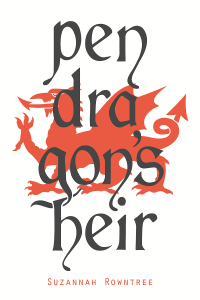 pass. Horrified by his loss, inspired by the sacrifice of his greatest warrior, and obligated by an emergent chivalric code, Charlemagne recrosses the Pyrenees and wins a resounding victory against the Saracens. Finally Ganelon, the traitor who betrayed Roland to the Saracens, is tried and executed, not so much for his betrayal of the kingdom as for his betrayal of the chivalric virtues of Christendom: fidelity to a lord, the bonds of brotherhood between Christian warriors, and the defence of the faith against pagans.
pass. Horrified by his loss, inspired by the sacrifice of his greatest warrior, and obligated by an emergent chivalric code, Charlemagne recrosses the Pyrenees and wins a resounding victory against the Saracens. Finally Ganelon, the traitor who betrayed Roland to the Saracens, is tried and executed, not so much for his betrayal of the kingdom as for his betrayal of the chivalric virtues of Christendom: fidelity to a lord, the bonds of brotherhood between Christian warriors, and the defence of the faith against pagans.
Very little, if any, of this story is historical. But what it gives us is a snapshot of medieval civilisation at the very flowering-point of chivalry. In Dr Grant���s summary, ���Roland���was the epitome of the great Christian knight. He was loyal, he was faithful, he was trustworthy to the end, and for Ganelon to betray that virtue with his cunning was to undercut the whole of Christian civilisation.��� Like many other stories, The Song of Roland uses its fiction to tell us what lies, most burning, more insistent, most truly in the hearts of its tellers and hearers.
If this is true for a single literary work like The Song of Roland, how much more might it be true for the Matter of Britain���one of the most often-retold tales in Western history?
The body of legends known today as the Arthurian legendarium, or the Matter of Britain, has come down to us in a vast body of iterations and reiterations. Scholars today continue to debate the existence of Arthur, the man at their centre. Did he really exist? Was he Roman, Celtic, or Sarmatian? And what, exactly, did he do? Defeat pagan invaders���win the battle of Mount Badon���preserve civilisation for a time before the Saxon conquest?
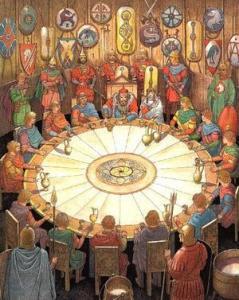 About the only thing we do know for certain is that the vast majority of the stories about this man were invented by pseudo-historians, minstrels, and romancers. We see each new storyteller putting his own gloss on each of the tales and sending it on to the next storyteller to gain new details, new characters, new adventures. At the same time they pick up new anachronisms: a courtly love tradition that certainly could not have existed in the sixth century when the real Arthur may have lived; a code of chivalry; the latest knightly weapons and fighting tactics.
About the only thing we do know for certain is that the vast majority of the stories about this man were invented by pseudo-historians, minstrels, and romancers. We see each new storyteller putting his own gloss on each of the tales and sending it on to the next storyteller to gain new details, new characters, new adventures. At the same time they pick up new anachronisms: a courtly love tradition that certainly could not have existed in the sixth century when the real Arthur may have lived; a code of chivalry; the latest knightly weapons and fighting tactics.
Apart from perhaps one small grain of truth, the Arthur legends are fiction. Yet, over the years I worked on Pendragon���s Heir, my own retelling of the Matter of Britain, I came to appreciate just how profoundly truthful these tales could be���a truth powerful enough to captivate storytellers and audiences from England and Wales to France and Germany, from the High Middle Ages right down to the present day.
For at the heart of the Arthurian legendarium in its most refined form there is a painful gash that lies like a wound between medieval ideals and medieval reality. In Thomas Malory���s classic English version of the myths, Le Morte D���Arthur, the knights of Arthur are a savage, sinful lot, far removed from the idealised knights-in-shining-armour of popular imagination. Some of the knights���Galahad, Perceval, Bors, and (nearly) Lancelot���truly are men of honour and integrity, but the majority are violent, unchaste men who not only break their oath of allegiance to the Round Table���s brotherhood but also fail to live the life of holiness and humility necessary for them to achieve the Quest of the Grail, the one thing that might establish their realm forever. CS Lewis calls them ���the peak which failed to reach heaven������the warriors who dreamed of something better, who reached out to grasp beautiful and high ideals, but who ultimately failed through their own sinfulness.
It was my aim in Pendragon���s Heir not so much to use the Arthurian legends to construct something new, or to provide a faithful picture of any particular historical time, as it was to probe this painful gash between ideals and reality, to explore in my generation the same issues which the medieval romancers explored in theirs. And as much as us, the medieval romancers had excellent reason to explore this topic: they lived in a world of fierce, nigh-unbeatable warriors who all too often broke their oaths, betrayed their marriage covenants, rebelled against their lords, and preyed on the very people they were sworn to protect.
But that is only half of the truth that lies at the heart of the Arthurian myth. The other half is an equally compelling image of virtue: against oath-breaking, oath-keeping. Against unlawful passions, a tender and Christlike love. Against rebellion, meekness and courtesy. Against oppression and exploitation, self-sacrifice and charity. And these qualities, too, rose to a high and fierce flame in the Middle Ages: not all men knocked, or sought, or asked, in vain, and if there were many defeats in the quest to incarnate the kingdom of heaven on the earth, there were also glorious and awe-inspiring victories.
My hope in Pendragon���s Heir is to introduce you to the world of Arthur, which is the world of medieval Christendom: not to tell you what the medievals did, but to show you what they thought, what they believed, and above anything else what they hoped to leave as a legacy to future generations. My hope is to sketch out for you a map of the medieval faith: their ideals, their hope, their fears.
It is a story of dreams and visions. But to the men who dreamed them, those dreams and visions were more immediate, more solid, more true than anything else in the world.
I hope that through Pendragon���s Heir, they will inspire you too.
��____________
 When Suzannah Rowntree isn���t travelling the world to help out friends in need, she lives in a big house in rural Australia with her awesome parents and siblings, trying to beat her previous number-of-books-read-in-a-year record. She blogs the results at www.vintagenovels.com and is the author of both fiction and non-fiction. Pendragon���s Heir is her debut novel.
When Suzannah Rowntree isn���t travelling the world to help out friends in need, she lives in a big house in rural Australia with her awesome parents and siblings, trying to beat her previous number-of-books-read-in-a-year record. She blogs the results at www.vintagenovels.com and is the author of both fiction and non-fiction. Pendragon���s Heir is her debut novel.
____________
Blanche Pendragon enjoys her undemanding life as the ward of an eccentric nobleman in 1900 England. It’s been 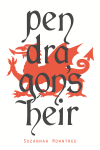 years since she wondered what happened to her long lost parents, but then a gift on the night of her eighteenth birthday reveals a heritage more dangerous and awe-inspiring than she ever dreamed of���or wanted. Soon Blanche is��flung into a world of wayfaring immortals, daring knights, and deadly combats, with a murderous witch-queen on her trail and the future of a kingdom at stake. As the legendary King Arthur Pendragon and his warriors face enemies without and treachery within, Blanche discovers a secret that could destroy the whole realm of Logres. Even if the��kingdom could be saved, is she the one to do it? Or is someone else the Pendragon’s Heir?
years since she wondered what happened to her long lost parents, but then a gift on the night of her eighteenth birthday reveals a heritage more dangerous and awe-inspiring than she ever dreamed of���or wanted. Soon Blanche is��flung into a world of wayfaring immortals, daring knights, and deadly combats, with a murderous witch-queen on her trail and the future of a kingdom at stake. As the legendary King Arthur Pendragon and his warriors face enemies without and treachery within, Blanche discovers a secret that could destroy the whole realm of Logres. Even if the��kingdom could be saved, is she the one to do it? Or is someone else the Pendragon’s Heir?

March 20, 2015
Lines from my WIP and a Party Invitation for YOU
The 777 challenge requires you go to Page 7 of your work-in-progress, scroll down to Line 7 and share the next 7 lines in a blog post. Once you have done this, you can tag 7 other bloggers to do the same with their work-in-progress.
The following lines are from the novel that is now in the hands of my beta readers, so they are definitely subject to change. But in the meantime, maybe they’ll give you a small glimpse into my story, since it may be a while before the rest of it is seen …
____________
Aylah looked at her husband, light flickering in her dark eyes. ���It���s a Gift, Eoghan, I know it.��� Her voice was��breathless with a timid excitement.
But a deep frown creased Eoghan���s face. He stood staring down at his son, who was frozen with the knowledge he had given himself away. Then his good hand shot out and took hold of Frayne���s arm. He jerked him to his feet. Frayne was fifteen, and already nearly as tall as his da. They stood eye to eye.
Eoghan’s voice was a low growl. ���How long?”
____________
Ok, so that was a very tiny glimpse. But you were introduced to the main character, Frayne, and in the throes of a fairly crucial scene, actually. So that’s something! I never like tagging people for these types of things, but I will leave it in your hands … if you’d like to share 7 lines starting from line 7 of page 7 in your WIP, go for it. Comment with your post link below and I’ll be sure to visit and read your lines!
____________
On another, completely unrelated, note … have you heard about Nadine Brandes’ 6-month-anniversary release party for her novel, A Time to Die? Well, it’s happening soon! March 31, in fact. I will be a special guest at the party (so excited!!), promoting The Word Changers (and giving away 2 Kindle copies of it). And Angie Brashear (Of the Persecuted) will be there, too!
You won’t want to miss it! Consider yourself invited! Click here to visit the party page :)

March 18, 2015
Tidings of New Stories
2 + 2 = 4
For those of you who follow my Facebook page, you’ll have seen that I’ve finished revisions (at last!) on book 1 of my new fantasy series, and have passed it on to my first round of beta readers. This is the first time I’ve used betas, so I’m naturally a bit nervous. It’s one thing to finish a book and hand it to your husband or sister or mom, knowing they will gush with praise. It’s quite another to hand it to someone and say, “Please tear it apart.”
*Gulp*

freedigitalphotos.net
I originally planned for this book to be one of two. The first draft of the sequel has been written already, in fact, although it is awaiting much work! However, something has happened along the way. Rather inevitably, I suppose …
The characters … have come alive.
One or two of them are asking for their own stories. A couple others are wishing for more of their stories to be told. It’s all I can do to keep up with the ideas that are being flung at me, and in the process … two additional book outlines have taken shape. So it looks like this book duo has now become, officially, a series. A family of four books … two of which are only ideas thus far, yes, but rather strong and insistent ideas.
*Another gulp*
A bit scary. Quite challenging for someone who has never even considered writing a series. But what a delicious challenge! I think I’m willing to tackle it :)
BETA READERS
As I’ve said, the first round of my beta readers have copies of the book already. However, I will be announcing, at a future date, my need for a second round of 2-4 readers. Those who follow my newsletter will be the first to hear about this opportunity, and if the need is filled by them, I may not be announcing it again on my blog.
NEW FAIRY TALE

freedigitalphotos.net
Before I launch into revisions for book 2 of the fantasy series, I am working on a novella of a fairy tale retelling that I plan on indie-publishing sometime soon (eek!). As it was written a couple of years ago, I’ve got a lot of work to do on it yet. I began revisions on it today, and I must say they are going swimmingly so far! I basically read through it and marked down all the “homework” I’ll need to do. Several hefty changes, but I’m excited to get started on them.
My wonderful newsletter followers will also be the first to hear about beta reading opportunities for this book, plus fun things like participation in the cover reveal, etc., when the time comes. (Ooh, helping design another cover … I’m definitely looking forward to that part!)
READING
On a rather random note, I just finished the amazing��His Dark Assassin trilogy by Robin LaFevers, and am in a bit of withdrawal. None of the books I pick up seem to be appealing to me, but I’m ready to dive into something. Any great suggestions?!

March 13, 2015
Ramblings on Writing Spaces
Growing up, all my stories and poems and songs and plays – even my first couple of books – went into spiral notebooks. They were badly smudged, with that pesky left-hander pencil smear across most of the pages. I can still remember the smell of pencil shavings and the satisfying rustle of pages turning.
I toted my notebooks and a fistful of sharpened pencils with me just about everywhere. Everywhere is the key word here. Because I wrote. Absolutely. Everywhere.
At the little desk overlooking our front yard in my teenage bedroom, in the closet under our back staircase, in the field behind our house while leaning against a hay bale (with my dog’s head in my lap, as often as not, and my horse grazing nearby), in the dusky, dusty barn loft with kittens playing around me, at family reunions, in the car on the way to piano lessons, sitting in the waiting room at the dentist …
Yeah. You get the point. Everywhere.
Years later, I still don’t have a particular place I write. Many times��it’s in the chair in my living room, sometimes at the desk (the same desk I used growing up!) in my bedroom or at the dining room window. Now and then I lug my laptop to the back patio or even out to the park so I can sit in the shade while my son plays. Several times I’ve taken it, along with a blanket, to sit on the bank of a pond while my son and husband fish. Once in a while I write while waiting in the parking lot to pick up my son from school.
But sometimes I find myself wondering: What would my true preference be, if I had the choice? Do I like still writing just about everywhere, like��I did as a teen? Or do I want to grow up at last, and have an office or writing workspace like the “professional” writers do? Would it help me concentrate? Or would it merely restrain my creativity?
The answer? I don’t really know. I’ve always been a strange mixture (thanks in part to two very extreme parents) of rigid control and organization, and get-me-out-of-here-I-need-to-breathe free spiritedness. I get inspired by new locations and fresh points-of-view. But sometimes I do long for the solidarity of a permanent writing location, even if I can see myself abandoning it on a whim for other writing spaces on a fairly regular basis …
Either way, I’ve always been fascinated with the places in which other artists choose to do their work, writers in particular. I’ll share a few pictures of my favorite writers in their work spaces, just for fun.
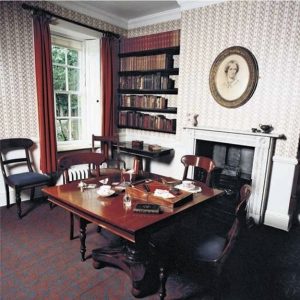
Charlotte Bronte’s writing space. Just think, Mr. Rochester may have been “born” right here! *sigh*
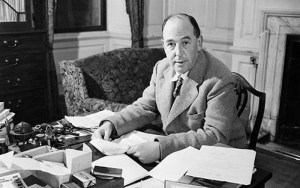
Well, you knew I wouldn’t leave C.S. Lewis out. I’ve heard his house was rather a mess … something he has in common with me, then! ;)
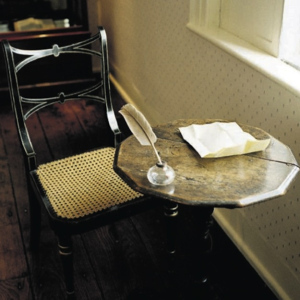
Jane Austen’s humble yet famous writing table. I WILL see it someday …
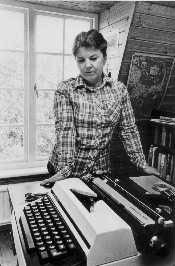
Joan Aiken with her typewriter. Her Wolves Chronicles will always have a special place in my heart. When you love something that much as a child, it just never goes away.
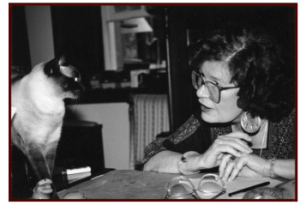
Elizabeth Peters, creator of one of my favorite sleuths of all time: Amelia Peabody!
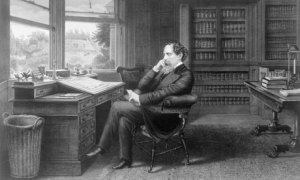
Charles Dickens, a total classic and a definite favorite.
So interesting to see the wide variety of places these authors worked! Rather inspiring in and of itself, really …
Do you have a favorite place to create things, write, craft, or even just daydream? Or are you a bit of a free spirit like I am?

March 2, 2015
An Allegorical God
God in allegory. Even though I’m an allegorical writer myself, I often have issues with this one. Well, maybe not issues. Let’s just say I approach it carefully.
God is sovereign. God is almighty and all-knowing. His ways are not our ways. How, then, can any writer��really do  Him justice in an allegory? We seek to know Him, but we’ll never know Him completely. Not on this side of death, anyway. If we did, He wouldn’t be God, right? But if we don’t understand Him, how can we write about Him in a way that will satisfy readers who want to see Him��in all His wonderful, awe-inspiring glory?
Him justice in an allegory? We seek to know Him, but we’ll never know Him completely. Not on this side of death, anyway. If we did, He wouldn’t be God, right? But if we don’t understand Him, how can we write about Him in a way that will satisfy readers who want to see Him��in all His wonderful, awe-inspiring glory?
I don’t have a cut and dried answer for this, really. I only know what I prefer when I read allegory, and the rules I personally follow when I write��God into an allegorical story of my own.
MYSTERY
An allegorical representation of God should be as mysterious as the true God. So we don’t understand all the facets of this God-character we write about. So our readers don’t. That’s ok. Use the mystery to good effect. Let the unknown deepen the reader’s experience of this God whose ways are not ours, and thus deepen their awe of Him.
EXTREME
Large or tiny. Roaring or whispering. God is anything but a lukewarm, mediocre Being. C.S. Lewis uses a great lion to represent God in his Chronicles of Narnia. In one scene of my book I represented God as a field mouse, whispering encouraging directions in the ear of the protagonist before a battle. Anne Elisabeth Stengl represents the holy spirit with a wood thrush, which I absolutely love. Whether it be intriguing, awe-inspiring, or even quirky, the character a writer chooses to represent God has to be worthy of the reader’s attention and respect.
FEARED
God is to be feared. We fear His wrath, His judgment, His anger when we have chosen to disregard His Word. But take away that fear and you’re left with little love and no respect at all. That’s not a the type of ruler I’d want to follow. Whatever creature or person a writer chooses to use as her representation of God within her story, it should be one whose actions and power inspire a healthy fear. God has the power over life and death and time and all the earth. Fiction shouldn’t show Him as anything less.
LOVING
Yet beyond the fear, a writer must be sure to��show the deep and unconditional love God has for His creation. Fear alone can perhaps turn our heads and keep in our minds what will happen if we stray. But it’s love that binds us to Him, heart and soul. It’s God’s mercy and forgiveness and sacrifice that give us the passion to follow Him to the ends of the earth. So why should an allegorical God be any different?
Do you have any preferences when reading Christian allegory? What are the things you like to see in a symbolic fictional God figure?


